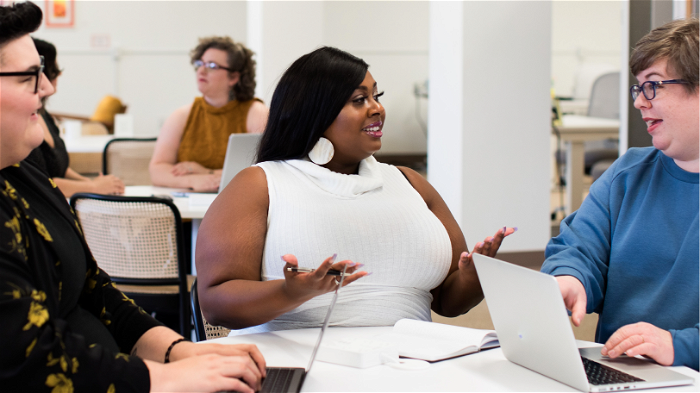In an ideal, equitable society, all learners and workers would be able to build professional social capital and use it to access the information and resources they need to find opportunities and make informed decisions about their work and learning journeys.
But for many people—and Black learners and workers in particular—professional social capital is the missing piece whose absence prevents them from achieving their full potential.
Professional social capital is a critical ingredient in any effort to promote equitable economic advancement. And we’re calling on all education, training, and workforce development programs to add or expand courses and activities designed to help Black learners and workers develop lifelong strategies for building professional social capital.
Why Professional Social Capital Matters for Black Americans
In the current labor market, “As much as 80 percent of jobs are filled through networking, which leaves students from less privileged backgrounds at a disadvantage,” JFFLabs Executive Director Kristina Francis and Andy Chan of Wake Forest University wrote in THE Campus.
Moreover, while both Black and white jobseekers are more successful in the labor market if they use their networks to find jobs, “network-based methods are less likely to lead to job offers for African Americans,” David S. Pedulla and the late Devah Pager wrote in an article in American Sociological Review. In the course of their research, Pedulla and Pager found that, compared with more formal methods of searching for a job, a “network-based job search . . . results in a higher probability of receiving a job offer for both Black and white job seekers. However, these benefits are significantly smaller for Black than for white job seekers.”
What’s the difference between Black and white jobseekers’ networks? In JFF’s recently published market scan, supported by University of Phoenix, we argue that the difference is the breadth and depth of the professional social capital that the networks have opportunities to build.
In light of those realities, training providers, workforce development programs, and colleges and universities must do two things:
- Ensure that Black Americans can build professional social capital that provides them with comparable degrees of access to information about job openings as their white peers
- Disrupt the systemic bias that have long prevented them from accessing those opportunities
What We Mean When We Say ‘Professional Social Capital’
Search Institute defines social capital as “the resources that arise from a web of relationships which people can access and mobilize to help them improve their lives and achieve their goals.” In our market scan, we build on that idea and use the term professional social capital to refer specifically to the resources that arise from a web of relationships and contribute directly to one’s education and career goals. It starts with the networks of friends, family, classmates, and coworkers people naturally build over the course of their lives, but it’s more than that, and individuals must learn strategies for building professional social capital by focusing on ways to add and activate resources and connections in their networks to achieve economic advancement.
If developing and utilizing professional social capital were explicit elements of the education and workforce journeys of all Black learners and workers, Black Americans would see stronger returns from their networks. They would have better access to connections and information with value in the labor market, and they would have the know-how to build, utilize, and mobilize their networks in ways that ensure labor market success.
Additionally, with stronger social capital, Black learners and workers would be better able to successfully contend with systemic challenges in access to programs of study leading to high wage jobs and careers, and discrimination in the workplace.
All Social Capital Has Value
A key lesson to impart is that all professional social capital has value. Programs should encourage Black learners and workers to be aware that everyone in their networks has something to offer, and that they shouldn’t overlook friends and relatives or former coworkers and classmates who are just starting out in their careers or work in frontline or support roles at their organizations.
To ensure that all Americans have equitable opportunities for economic advancement, postsecondary leaders and employers alike need to be intentional about helping all learners and workers build professional social capital.
As Pedulla and Pager write in American Sociological Review, the “informal nature of networks of opportunity appears highly consequential for the perpetuation of racial inequality in the United States.”
Therefore, we must be deliberate about building professional social capital for all learners and workers, in particular Black learners and workers. JFF’s recent report identifies five key strategies that the most innovative social capital development programs must incorporate to build professional social capital for Black learners and workers: elevating current assets, building relationships, making connections and introductions, career onboarding, and supporting continuous learning journey. It offers recommendations for how education, training, and career development programs can effectively create conditions at the individual level, and control for conditions at the systems level, that help ensure that learners and workers can fully develop and readily activate their professional social capital.
Programs can also refer to resources like the Clayton Christensen Institute’s playbook, produced by Julia Feeland Fisher, director of education research at the Institute who serves on JFF’s advisory council focused on professional social capital. The playbook helps students build social capital to find ideas on how to incorporate and measure strategies to do so.
While we don’t know what the future of work looks like, it’s clear that skills, credentials, and degrees will not be enough to ensure that Black Americans succeed in the labor market at the same rate as their white peers. Professional social capital is a key component they need to navigate and succeed in their careers—and share their prosperity with fellow members of their communities.



